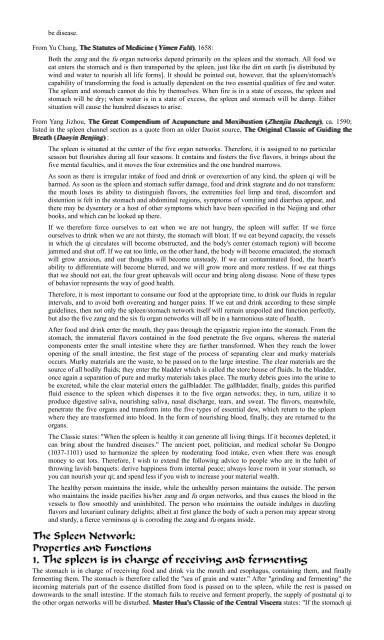You also want an ePaper? Increase the reach of your titles
YUMPU automatically turns print PDFs into web optimized ePapers that Google loves.
e disease.<br />
From Yu Chang, The Sttattuttes of Mediiciine (Yiimen Fallü), 1658:<br />
Both the zang and the fu organ networks depend primarily on the spleen and the stomach. All food we<br />
eat enters the stomach and is then transported by the spleen, just like the dirt on earth [is distributed by<br />
wind and water to nourish all life forms]. It should be pointed out, however, that the spleen/stomach's<br />
capability of transforming the food is actually dependent on the two essential qualities of fire and water.<br />
The spleen and stomach cannot do this by themselves. When fire is in a state of excess, the spleen and<br />
stomach will be dry; when water is in a state of excess, the spleen and stomach will be damp. Either<br />
situation will cause the hundred diseases to arise.<br />
From Yang Jizhou, The Greatt Compendiium of Acupunctture and Moxiibusttiion (Zhenjjiiu Dacheng), ca. 1590;<br />
listed in the spleen channel section as a quote from an older Daoist source, The Oriigiinall Cllassiic of Guiidiing tthe<br />
Breatth (Daoyiin Benjjiing) :<br />
The spleen is situated at the center of the five organ networks. Therefore, it is assigned to no particular<br />
season but flourishes during all four seasons. It contains and fosters the five flavors, it brings about the<br />
five mental faculties, and it moves the four extremities and the one hundred marrows.<br />
As soon as there is irregular intake of food and drink or overexertion of any kind, the spleen qi will be<br />
harmed. As soon as the spleen and stomach suffer damage, food and drink stagnate and do not transform:<br />
the mouth loses its ability to distinguish flavors, the extremities feel limp and tired, discomfort and<br />
distention is felt in the stomach and abdominal regions, symptoms of vomiting and diarrhea appear, and<br />
there may be dysentery or a host of other symptoms which have been specified in the Neijing and other<br />
books, and which can be looked up there.<br />
If we therefore force ourselves to eat when we are not hungry, the spleen will suffer. If we force<br />
ourselves to drink when we are not thirsty, the stomach will bloat. If we eat beyond capacity, the vessels<br />
in which the qi circulates will become obstructed, and the body's center (stomach region) will become<br />
jammed and shut off. If we eat too little, on the other hand, the body will become emaciated, the stomach<br />
will grow anxious, and our thoughts will become unsteady. If we eat contaminated food, the heart's<br />
ability to differentiate will become blurred, and we will grow more and more restless. If we eat things<br />
that we should not eat, the four great upheavals will occur and bring along disease. None of these types<br />
of behavior represents the way of good health.<br />
Therefore, it is most important to consume our food at the appropriate time, to drink our fluids in regular<br />
intervals, and to avoid both overeating and hunger pains. If we eat and drink according to these simple<br />
guidelines, then not only the spleen/stomach network itself will remain unspoiled and function perfectly,<br />
but also the five zang and the six fu organ networks will all be in a harmonious state of health.<br />
After food and drink enter the mouth, they pass through the epigastric region into the stomach. From the<br />
stomach, the immaterial flavors contained in the food penetrate the five organs, whereas the material<br />
components enter the small intestine where they are further transformed. When they reach the lower<br />
opening of the small intestine, the first stage of the process of separating clear and murky materials<br />
occurs. Murky materials are the waste, to be passed on to the large intestine. The clear materials are the<br />
source of all bodily fluids; they enter the bladder which is called the store house of fluids. In the bladder,<br />
once again a separation of pure and murky materials takes place. The murky debris goes into the urine to<br />
be excreted, while the clear material enters the gallbladder. The gallbladder, finally, guides this purified<br />
fluid essence to the spleen which dispenses it to the five organ networks; they, in turn, utilize it to<br />
produce digestive saliva, nourishing saliva, nasal discharge, tears, and sweat. The flavors, meanwhile,<br />
penetrate the five organs and transform into the five types of essential dew, which return to the spleen<br />
where they are transformed into blood. In the form of nourishing blood, finally, they are returned to the<br />
organs.<br />
The Classic states: "When the spleen is healthy it can generate all living things. If it becomes depleted, it<br />
can bring about the hundred diseases." The ancient poet, politician, and medical scholar Su Dongpo<br />
(1037-1101) used to harmonize the spleen by moderating food intake, even when there was enough<br />
money to eat lots. Therefore, I wish to extend the following advice to people who are in the habit of<br />
throwing lavish banquets: derive happiness from internal peace; always leave room in your stomach, so<br />
you can nourish your qi; and spend less if you wish to increase your material wealth.<br />
The healthy person maintains the inside, while the unhealthy person maintains the outside. The person<br />
who maintains the inside pacifies his/her zang and fu organ networks, and thus causes the blood in the<br />
vessels to flow smoothly and uninhibited. The person who maintains the outside indulges in dazzling<br />
flavors and luxuriant culinary delights; albeit at first glance the body of such a person may appear strong<br />
and sturdy, a fierce verminous qi is corroding the zang and fu organs inside.<br />
The stomach is in charge of receiving food and drink via the mouth and esophagus, containing them, and finally<br />
fermenting them. The stomach is therefore called the "sea of grain and water." After "grinding and fermenting" the<br />
incoming materials part of the essence distilled from food is passed on to the spleen, while the rest is passed on<br />
downwards to the small intestine. If the stomach fails to receive and ferment properly, the supply of postnatal qi to<br />
the other organ networks will be disturbed. Mastter Hua''s Cllassiic of tthe Centtrall Viiscera states: "If the stomach qi

















